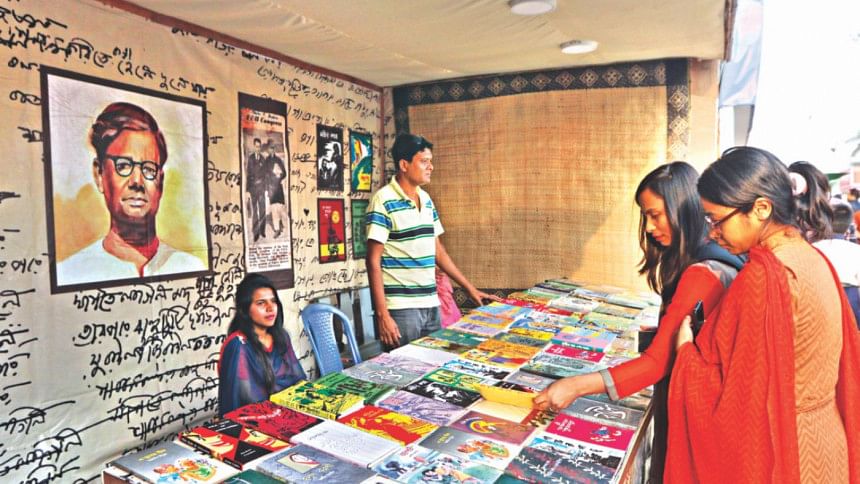A journey back to roots

“Baba, can we go home now,” said Shipra while pulling her father's arm.
Her father, Sardar Ali, a private job holder, smiled at the seven-year-old and said, “But I wanted to buy some books too.”
“Not today,” she said right away.
This correspondent met the father and daughter duo in front of the entrance of the Amar Ekushey Granthamela at Suhrawardy Udyan yesterday afternoon.
When asked, the father pointed towards the bag Shipra was holding tight on her other hand. There was a book inside it -- “Thakurmar Jhuli” (Grandma's Bag of Tales).
She wants to go home as soon as possible and start reading the book, said her father. “Alright, let's go home.”
Shipra beamed with joy. While leaving, she said, “I like 'Thakurmar Jhuli' very much because it has a lot of adventure stories.”
Not just her, there are many admirers of folk tales, who throng the book fair regularly as it brings together all strands of the folk tradition.
With its rich tapestry of themes, Bangla folk literature reflects the diversity of various ethnic, linguistic and religious groups.
Passed down through generations orally, these folk tales range from fairy, mythical or religious tales, adventure stories, heroic narratives, sage tales, historical tales, legends, animal stories or fables to the struggles of life reflected in witty proverbs and riddles.
Like every year, the Ekushey book fair remains an open invitation to the bookworms to embark on a literary journey that would take a reader back to her or his roots.
And, the journey is never fulfilled without reading the works of Jasim Uddin.
His works are a testament to the simple, timeless appeal of rural Bangladesh and folk life. His poetic rhythms are drawn from folk elements -- easy on the ear and quick to embed in the memory. He was also a writer of fine prose -- fluent, witty, and expressive.
Palash Prokashani, the publication house the “Palli Kabi” (folk poet) founded in 1960, presents his works to the readers, from its stall at Suhrawardy Udyan. The poet's son, Khurshid Anwar Jasim Uddin, is now running the publication house.
The stall is thronged by visitors of all ages.
“I used to read his [Jasim Uddin] writings as a child. Those stories were full of surprises…,” said Irfat Ara.
“I am buying his books for my son and myself. Every time I read his poems, I feel like revisiting my childhood. I want my son to share the joy too.”
The stall introduces the new generation to his literary masterpieces including the poetry books “Nakshi-Kathar Math” (The field of the embroidered quilt), “Dhankhet” (Paddy field), “Rakhali” (Shepherd), and “Sojan Badiyar Ghat” (Gypsy wharf). These books never get old, said Ripon, a volunteer at the stall.
The stall also has books by folklore researcher Dinesh Chandra Sen. His “Puronari” and “Gharer Kotha o Joog Sahitya” is also drawing readers' attention.
“Folklore is an integral part of Bangla literature. It also constitutes a considerable portion,” said Osman Gani. “It also soothes my mind. Reading folk literature is like taking a journey back home,” said the retired teacher.
He came to the book fair with his daughter.
His daughter, Tabssum Prome, a student of Bepza Public School and College, is a reader of the genre too. “My father likes folklore very much. As for me, I want to explore the genre more,” she said. Her father bought “Nakshi-Kathar Math” for her.
Bangla Academy also has a large collection of books on folklore. The academy published books on the folk traditions of 57 districts, drawing large crowds every day. People were seen collecting the book, which describes the folklore and history of their district to relive the memories.
Most of the books are edited by Bangla Academy Director General Shamsuzzaman Khan, a folklorist.
“Bangladesh er Lokooitijjho”, “Folklore New Challenges” (English translation) and “Bangladesh er Lokosongit Somikkha” are some of the popular choices at the stall.
Other than Bangla Academy, there are quite a few stalls showcasing folk literature.
Aninda publication has published, “Bangladesher Lokokahini”, a three-part series written by Muhammad Habibullah Pathan. Meanwhile, “Loko Sangskriti o Lokosahitya” by Mahbubul Haque is available at Anya Prokash. Yesterday, 133 new books arrived.

 For all latest news, follow The Daily Star's Google News channel.
For all latest news, follow The Daily Star's Google News channel. 




Comments